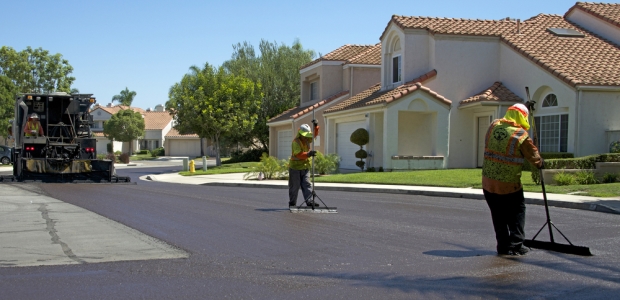
Another Warning About Coal Tar Sealant
The U.S. Geological Survey's latest study showed rainwater runoff caused 100% mortality to minnows and water fleas, which are part of the base of the food chain.
The U.S. Geological Survey announced that its latest study of coal tar-based sealant's effects showed rainwater runoff after its application caused 100 percent mortality to minnows and water fleas, which are part of the base of the food chain. Runoff from pavement with it is toxic to aquatic life, damages DNA, and impairs DNA repair, according to the latest studies by USGS published in the journals Environmental Science and Technology and Science of the Total Environment.
"Pavement sealant is a black liquid sprayed or painted on the asphalt pavement of parking lots, driveways, and playgrounds to improve appearance and protect the underlying asphalt. Pavement sealants that contain coal tar have extremely high levels of polycyclic aromatic hydrocarbons (PAHs). Coal tar is a known human carcinogen; several PAHs are probable human carcinogens and some are toxic to fish and other aquatic life," according to the agency. "Rainwater runoff collected as long as three months after coal tar-sealcoat application caused 100% mortality to minnows and water fleas, which are part of the base of the food chain, when the test organisms were exposed to ultra-violet radiation to simulate sunlight."
"The simultaneous occurrence of DNA damage and impairment of DNA repair has important implications for cell health," said Sylvie Bony, who led the study at the Ecole Nationale des Travaux Publics de l’Etat (ENTPE), a French research agency in Lyon, France.
"The USGS has been studying coal tar-sealcoat as a source of PAHs for 10 years, and findings from these two studies are consistent with what is known about toxicity and genotoxicity of these chemicals," said USGS scientist Barbara Mahler.
According to USGS, coal tar-based sealcoat products typically are 20-35 percent coal tar or coal-tar pitch, which are known human carcinogens, and coal tar-based pavement sealcoat typically contains 35,000 to 200,000 ppm PAHs, "about 100 times more PAHs than in used motor oil and about 1,000 times more PAHs than in sealcoat products with an asphalt base," according to the agency.